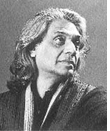| Islam and Spiritualism | |
| 30 Nov 2010, NewAgeIslam.Com |
 While unfolding the vibrant love story of Heer and Ranjha, the book also engages the reader in Dara Shikoh’s secular journey and his desire to understand and follow both Hinduism and the Islam faith. Besides this, there are articles on Guru Nanak and Beas. Waris Shah the famous Sufi poet who immortalises Heer Ranjha in verse displayed a lyrical quality that reached the masses. Desolate with the massacre of the partition Poet Amrita Pritam’s plaint to Waris Shah is recorded. While artist Manjit Bawa’s love for Sufism is reflected in his paintings, the universal love and light of Baba Farid is beautifully portrayed in the book. -- Divya Kapoor
While unfolding the vibrant love story of Heer and Ranjha, the book also engages the reader in Dara Shikoh’s secular journey and his desire to understand and follow both Hinduism and the Islam faith. Besides this, there are articles on Guru Nanak and Beas. Waris Shah the famous Sufi poet who immortalises Heer Ranjha in verse displayed a lyrical quality that reached the masses. Desolate with the massacre of the partition Poet Amrita Pritam’s plaint to Waris Shah is recorded. While artist Manjit Bawa’s love for Sufism is reflected in his paintings, the universal love and light of Baba Farid is beautifully portrayed in the book. -- Divya Kapoor
Photo: Muzaffar Ali
| Under the sufi spell | |
By Divya Kapoor Be it films, music festival, clothes or paintings, he has celebrated Sufism all the way. And now, the noted film director, artist, fashion designer, Sufi follower and politician Muzaffar Ali, has compiled The Sufi’s of the Punjab a coffee table book by Rumi Foundation in association with The Lalit Suri Hospitality Group. The articles of the book are a fusion of different faiths with similar goals aspiring peaceful co-existence, communal harmony and love for each other. Calling Punjab the gateway of India, Ali said that the Sufis have been in Punjab for over thousand years, thanks to the constant movement of people. “Punjab has always been at the crossroads… people have gone out of the city and come into it. For instance, Guru Nanak Dev ji went to places like Mecca and Baghdad and Niyamat Ali Bhojpuri came to India. Like this, there have also been invaders and conquerors in the country. While all this was going on, there was a kind of message of peace and tolerance that was being generated. Punjab in that sense is very significant as all this affected its spiritual side,” he said. URL: http://www.newageislam.com/NewAgeIslamIslamAndSpiritualism_1.aspx?ArticleID=3749 |




 Moderate Islamist here
Moderate Islamist here


0 comments:
Post a Comment